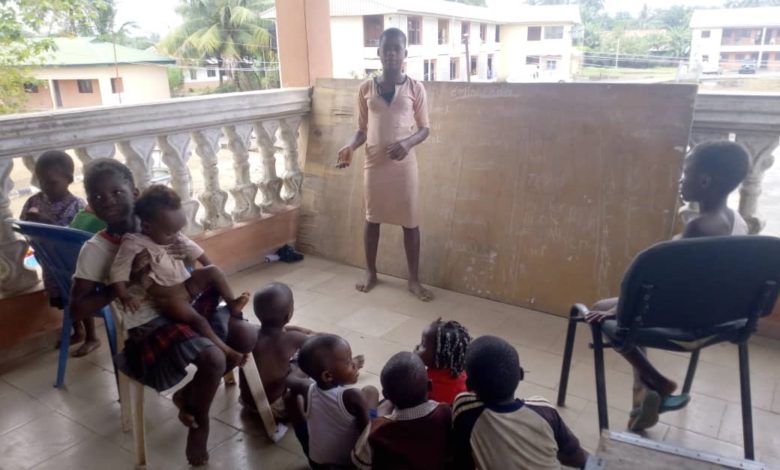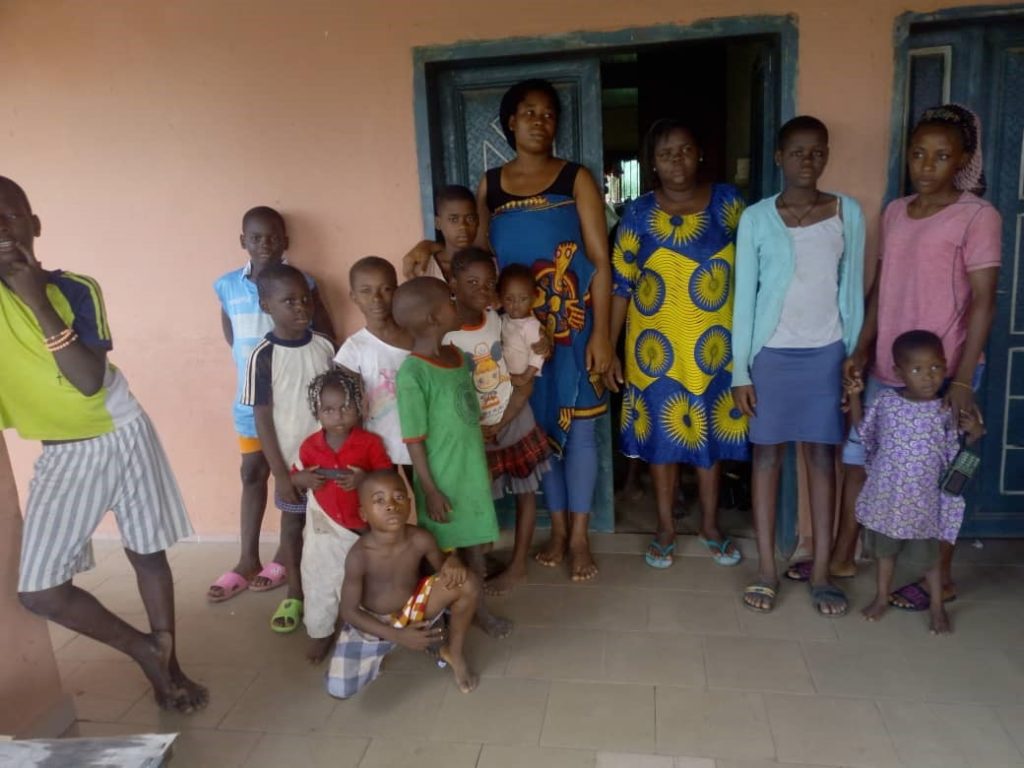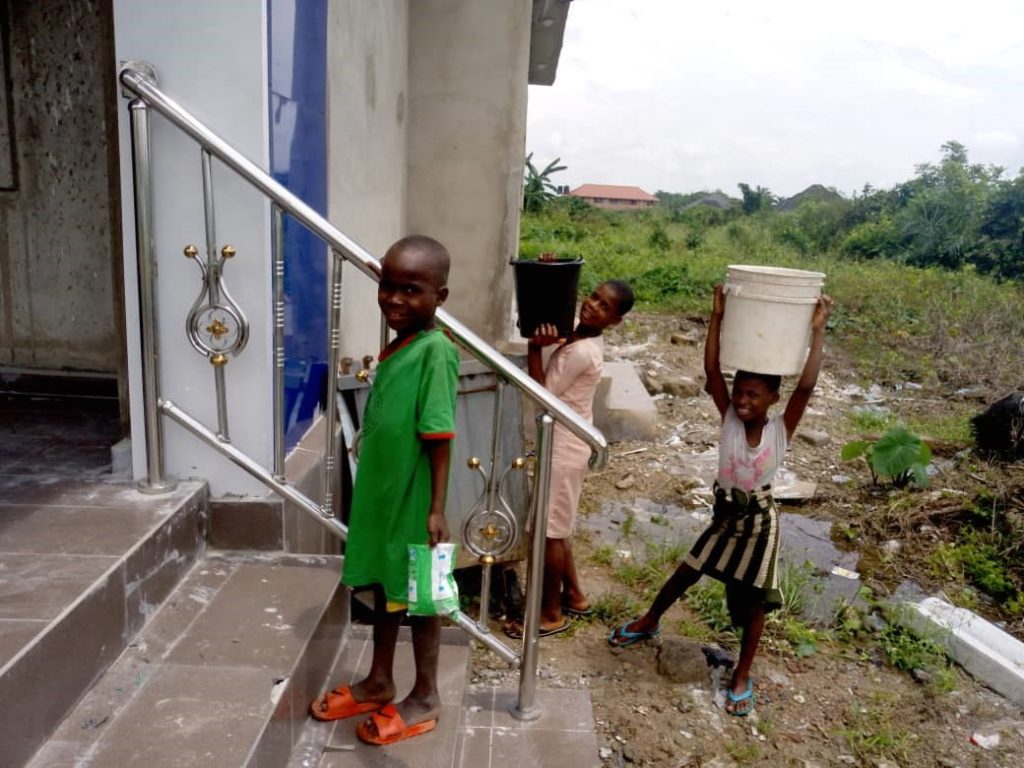Flood: Displaced Persons In Camps Beg For Attention In Anambra

Chinazaekpere Orichi, an 11-year-old girl, is taking refuge at Ogbaru Local Government Secretariat, Atani, relief camp in Anambra State, for persons displaced by flood caused by the rise of water from the River Niger.
Orichi who is at the camp with her mother was sacked from their home in Umudaike village, Atani, where schools have been submerged by flood water and she cannot go to school.
With her are other children of primary school age numbering about 40 who have been in camp with their parents for about a month and who sleep and wake daily without access to formal education.
When HumAngle visited, Chinazaekpere, a primary six pupil, was conducting a class session for other children in camp for whom she acted as their teacher.
“I am in primary six but I did not go to school because of the flood. Normally, I teach my friends because nobody comes to teach us.
“I teach them different subjects everyday, like today, I am teaching them four letter words,” she said.
The little girl used an improvised chalkboard without textbooks or any teaching aid while the other children listened and recited the lesson.
With the flood affecting most parts of the local government area and schools, teachers in Ogbaru are presently at home.
It is, however, expected that special arrangements would be made by the education authorities to cater to the needs of children in camps.

Miss Joy Alale, an inmate, said they were having difficulties with power supply, access to clean water and food.
Alale said displaced persons provided for themselves with those who had surplus sharing with their neighbours.
She said the water level was rising everyday and that the people could not go back home.
Alale called on the Federal Government and Anambra State Government to come to the aid of the people.
“It is difficult for us here because we don’t have light, we don’t have water, food is a major challenge for us here, we have complained but they said we should exercise patience.
“Everyday we go out to look for what to eat, yesterday some people went to hunt for snails so they can sell in the markets, others go and do different kinds of jobs, we are few now because most of us have gone out.
“This place serves mainly as shelter for us; we are entirely on our own, we buy drinking water and use rain water when it falls,” she said.
Mrs Mary Uzo, a 70-year-old woman, said she had been in camp for about three weeks and all materials, such as mats and buckets, she used, were brought from home.
Uzo said the local government had been doing its best to ease the hardship of inmates but called on the national and state emergency agencies to provide them medical services and clean water.
Agatha Orichi, Chinazaekpere’s mother, cried over their displacement from home and expressed fear that the experience they had in 2018 when they spent three months in camp did not reoccur.
She said the lastp time they were in camp, all they got per family was eight cups of rice, eight cups of beans, one satchet of milk, disinfectant and bucket.
“As of now, they have not given us anything, we are the ones feeding ourselves; we want government to come and help us,” she said.

Mr Chukwudi Onyejekwe, a Directort with Anambra State Emergency Management Agency (SEMA), said the agency had arranged to provide basic amenities at the holding camps in the state .
Onyejekwe said the flood came earlier than expected and that people moved into the camps while preparations were still being made in the 16 camps set up to deal with the problem.
He said the agency and other partners would embark on assessment tours of the camps to ascertain their needs in the light of the population of displaced persons in them.
“The flood came more sudden than we envisaged so some things are still being put in place, so SEMA as the coordinating agency is ensuring that the relevant people play their roles.
“I can assure that in the next two days some of these things like water, clinic and other facilities will be in place.
“Sadly, some of our camps and the facilities have been submerged by flood which exceeded our forecast,” he said.
In September, the government advised the people to move into holding camps as floods surged into homes.
It promised to equip the camps with clinics and medical supplies as well as other facilities to ease the pains of inmates.
The Nigeria Hydrological Services Agency had named Anambra among 28 states likely to experience flooding during the year.
Support Our Journalism
There are millions of ordinary people affected by conflict in Africa whose stories are missing in the mainstream media. HumAngle is determined to tell those challenging and under-reported stories, hoping that the people impacted by these conflicts will find the safety and security they deserve.
To ensure that we continue to provide public service coverage, we have a small favour to ask you. We want you to be part of our journalistic endeavour by contributing a token to us.
Your donation will further promote a robust, free, and independent media.
Donate HereStay Closer To The Stories That Matter




